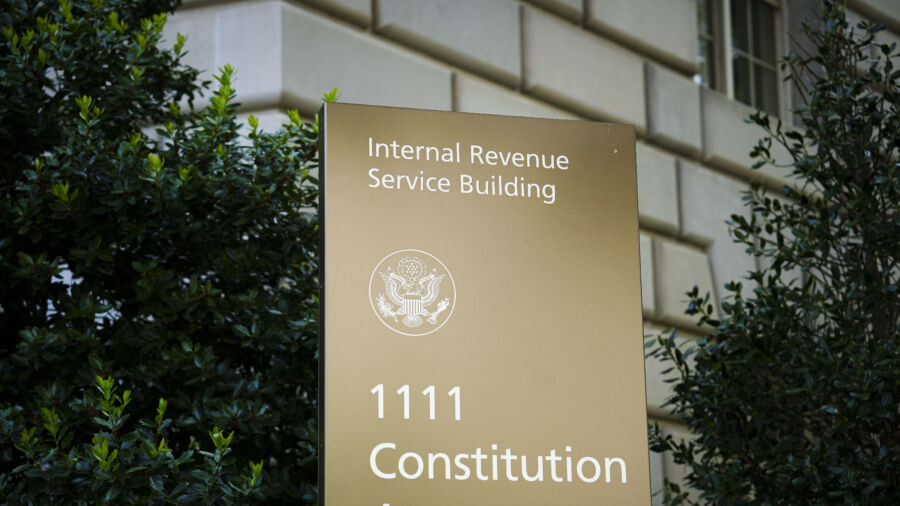The Internal Revenue Service (IRS) has released a list of things taxpayers should keep in mind while preparing to file taxes in 2024, including new features in online accounts, refund delays, tax credit refunds, and securing energy credits.
Taxpayers can now use their IRS online account to “view, approve and electronically sign power of attorney and tax information authorizations from their tax professional,” the agency said in a Dec. 11 press release. The account can also be used for viewing taxes owed, payment history, requesting tax receipts, applying for payment plans, and validating bank accounts. The IRS reminded taxpayers to avoid refund delays, and gain an understanding of refund timing.
“Although the IRS issues most refunds in less than 21 days, the IRS cautions taxpayers not to rely on receiving a 2023 federal tax refund by a certain date, especially when making major purchases or paying bills,” the agency said.
“Some returns may require additional review and may take longer to process if IRS systems detect a possible error, the return is missing information, or there is suspected identity theft or fraud.”
The IRS pointed out that it won’t be able to issue refunds for people who claim Earned Income Tax Credit (EITC) or Additional Child Tax Credit (ACTC) prior to mid-February. The agency only expects these credit refunds to be available in taxpayer bank accounts by Feb. 27.
The IRS stressed that filing returns electronically and choosing the “direct deposit” option is the fastest way to get refunds compared to a paper check.
Prepaid debit cards and mobile apps “may allow direct deposit” of refunds depending on whether they have “routing and account numbers associated with them to enter on the tax return.”
The agency also touched on the energy-related credits for taxpayers who bought an electric vehicle. To claim the credits, taxpayers need to provide the vehicle’s VIN and also include “Form 8936, Qualified Plug-in Electric Drive Motor Vehicle Credit” while filing their returns.
Individuals who bought a new electric vehicle in 2022 or before can check whether they qualify for the credit online. There is a separate link for those who have made the purchase in 2023.
Taxpayers who have made energy improvements in their homes can seek credit by filing “Form 5695, Residential Energy Credits, Part II” with their returns.
The IRS recommends taxpayers develop a record-keeping system that keeps relevant tax information in one place.
This includes documents like Form W-2 from employers, Form 1099 from banks or other payers, Form 1099-K from third-party payment networks, Form 1099-NEC for nonemployee compensation, Form 1099-MISC for miscellaneous income, or Form 1099-INT for interest paid.
“When they have all their documentation, taxpayers are in the best position to file an accurate return and avoid processing or refund delays,” the agency stated. The last quarterly estimated tax payment for 2023 is due on Jan. 16, 2024.
Form 1099-K Reporting
The IRS also reminded taxpayers about Form 1099-K reporting. The 1099-K form applies to people who are engaged in activities like gig work and casual sellers who make side or extra income via selling their services or goods.
Starting this year, a new IRS rule required that third-party payment networks like PayPal, Venmo, Amazon, and Square issue Form 1099-K when a user receives more than $600 in gross sales from goods and services transactions in a single year. Earlier, the threshold of gross sales was over $20,000.
As the IRS works on implementing the new law, the agency will treat tax year 2023 as a “transition year,” easing the burden on taxpayers.
“This will reduce the potential confusion caused by the distribution of Forms 1099-K sent to many taxpayers who wouldn’t expect one and may not have a tax obligation. As a result, reporting will not be required unless the taxpayer receives over $20,000 and has more than 200 transactions in 2023,” the agency said.
“Given the complexity of the new provision and the large number of individual taxpayers affected, the IRS is planning for a threshold of $5,000 for tax year 2024 as part of a phase-in to implement the $600 reporting threshold.”
Sometimes, taxpayers can get a Form 1099-K when they actually shouldn’t. For instance, payments made via third-party apps to friends or family members as gifts or reimbursements can erroneously trigger Form 1099-K reporting.
People can also receive a Form 1099-K that does not belong to them or is a duplicate of one that they have already received.
Under such circumstances, the IRS recommends that taxpayers contact the form issuer immediately. Check the “Filer” section on the top left corner of the form to identify the name and contact information of the issuer. Once contacted, ask the issuer to issue a corrected Form 1099-K.
“Don’t contact the IRS. We can’t correct your Form 1099-K,” the agency states. “File your taxes even if you can’t get a corrected form. Don’t wait to file your taxes.”
1099-K is an “information return” form submitted by third parties like PayPal. Individual taxpayers can use these returns to complete their tax filings. The IRS uses 1099-K to verify income and taxes reported by taxpayers.
The policy to reduce the gross sales threshold from $20,000 to just $600 was included in the American Rescue Plan Act of 2021 signed by President Joe Biden.
From The Epoch Times

